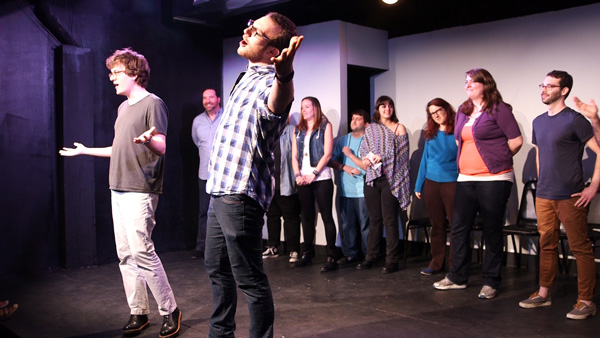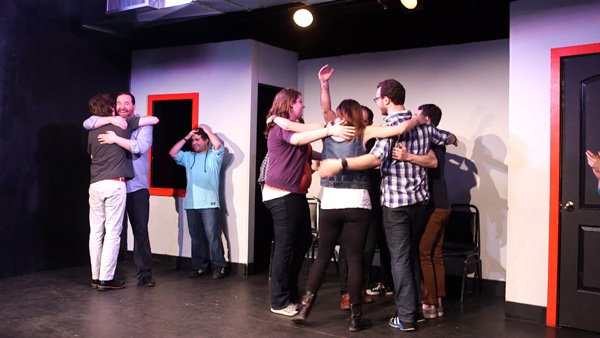
BY ERIC LEVITZ | When Robin Williams killed himself last August, the news was met with an unsettling combination of shock and recognition. Legions of admirers struggled to comprehend how the comedian, who brought joyous life to Mrs. Doubtfire and Aladdin’s Genie, could harbor such despair. Yet, the contradiction itself was a cliché: Williams fit seamlessly into the archetype of the sad clown, whose painted smile masks a tormented soul.
But at the Magnet Theater, a troupe of troubled improvisers is challenging the idea of the comic as masked depressive. Rather than using humor to obscure pain, the cast of “You Are Not Alone: An Uplifting Show About Depression” performs improv comedy that engages and exposes mental anguish.
April’s show opened with 29-year-old Kerry Kastin, spotlight at center stage, reading an essay about grief. An audience of comedy fans and performers’ friends oscillated between rapt silence and nervous laughter as Kastin read, “If I weren’t grieving, I’d still fear death and I wouldn’t cry during a trailer for some movie starring Dennis Quaid about saving a dolphin.”
Each performance of “You Are Not Alone” begins with an improviser or guest essayist reading a short memoir about their experience with mental illness, which then serves as inspiration for a set of comedic scenes. This process is repeated twice more, with the troupe eventually weaving together threads from each essay, along with the motley absurdities that 40 minutes of improv will produce.
The tonal shifts between the essays and the improv can be stark. Kastin spoke of crying in front of the children she babysat, and quitting her office job after realizing that her co-workers didn’t even notice when she missed work. Her hands lightly shook as she read the essay’s final lines: “Because I am grieving, I weep when I brush my teeth. And I keep living because my parents need me to, and because someday, I hope, I’ll want me to.”
Minutes later, with steady hands and winning confidence, she made comedy out of her frustrated longing for empathy. Conjuring a world in which her co-workers fully met her emotional needs, Kastin played the manager of an office where no work was ever accomplished, as all focused their energy on writing get-well cards and assembling flower baskets for their absent colleagues.
The show was conceived last summer, shortly after co-creator Aaron Gold fell into one of his “downswings.” Between bouts of staring into the abyss of his bedroom’s ceiling, the 27-year-old comedian reached out to his computer’s webcam, recording short monologues about what it was like to live with depression. He then posted these to YouTube, where his friend and fellow Magnet improviser Grant Goldberg saw them. Goldberg was already working on a pitch for a show about depression, and saw Gold’s unsentimental appeals for understanding as a model for his own project.
“The worst part about depression is the isolation,” said Gold. “And so with this show, we’re trying to talk about it, to let people who are going through it know they’re not alone.”
Often, the show’s comedic scenes bear only a tangential relationship to the essays that precede them. But by creating a show where a memoir of childhood sexual abuse can be followed by a scene of stoner “Fishheads” grooving to the musical stylings of literal fish, Gold hopes to lessen the stigma surrounding mental illness.
“The message is: You don’t have to treat a depressed person like they’re diseased. They’re just normal people who are going through something, and they can still laugh, even at the horrible things that have happened to them.”

Before joining the show’s cast, Candice Opperman had trouble talking with her family about her mood disorder. Even after anxiety forced her to quit a lucrative job in finance, they rarely spoke about the condition that had transformed her life.
“I come from a large Irish Catholic family where we didn’t really talk about things, and so no one thought someone who was ‘successful’ could suffer from mental illness,” she said. “But when they came to the show and heard other peoples’ words, they realized it’s real, and I’m dealing with it. And they love me, so they want to deal with it now too.
Her mother, Maryita Opperman, says that the show made her realize that “everyone has something. And so, just like you need to have your eyes checked by a doctor, we need to be checking in with each other, emotionally.”
At the end of every performance, the audience is invited to join the cast in an onstage group hug. But the most profound connections happen later, at the theater bar, where performers say they often find themselves in bracingly personal conversations about mental illness, with audience members who’d been strangers just hours before.
The DSM-5 (Diagnostic and Statistical Manual of Mental Depression, Fifth Edition) does not recognize “heartfelt conversations with tipsy fans of your comedy” as an effective treatment for depression. Perhaps it should. Since they started hosting their monthly show at the Magnet last September, neither Gold nor Goldberg has experienced a significant depressive episode.
The day after Williams’ death, psychologist Deborah Serani told ABC News that comedians “often wear what we call ‘the mask of depression,’ which helps them put on a more acceptable face to the world…the laughter distracts from feelings of weakness.”
But Dr. Serani believes Gold and Goldberg are using humor to an entirely different end. She maintains that there is some truth to the sad clown archetype, that humor can be used to deflect from one’s pain. But any medicine can be abused, and laughter is still among the best we’ve found.
“We don’t heal in isolation, we heal in community,” she said. “So when you see that others have had a somewhat similar experience, and when you can laugh with them about it, the shame of what you’re going through lifts. And then you can invite other possibilities into your life.”
“You Are Not Alone: An Uplifting Show About Depression” will return to the Magnet Theater (254 W. 29th St. at Eighth Ave.) on Mon., June 22, at 7 p.m. For tickets ($7), visit magnettheater.com.































